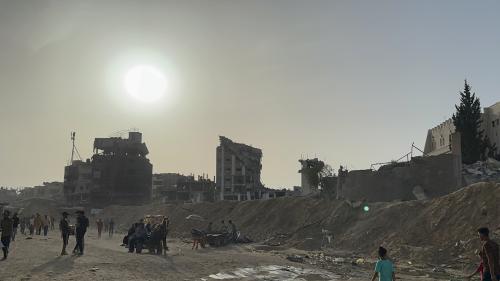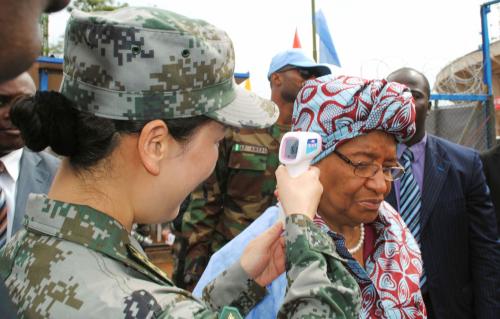Editor’s Note: In his retirement remarks delivered at the U.S. Naval Academy, General John Allen recognizes the sacrifice of American forces over the last 13 years of conflict as well as the Marine Corps’ dedication to the country since its founding. After nearly 35 years of service, General Allen’s most recent assignment was as commander of ISAF and US Forces in Afghanistan.
Thank you Commandant for consenting to this event and supporting it so magnificently.
In the same breath, Colonel Cabaniss, the commander of these magnificent Marines who stand before you today, the Marines of our Oldest Post in the Corps, the Marines of Marine Barracks Washington, thank you for your enormous support of this event.
Secretary of the Navy Mabus, ADM Greenert, and VADM Miller, thank you for permitting this ceremony to occur at the Naval Academy, this incomparable institution that has such meaning to our Navy and Marine Corps.
This day … retirement … comes for all of us eventually, and while often it is viewed in a manner akin to the coming of the Grim Reaper, I can tell you for my family and for me, this day marks a new beginning for the Allens. Our distant horizon is bright. Many of our dearest friends have gone aloft, high into the rigging, and are helping us to see what’s ahead and to plot a course into the future.
It would not be possible to put into words what I’m feeling this afternoon. I grew up in a Navy family … a Navy junior … and enlisted in April 1971, shortly after I turned 17, and from the day I was born to this moment, I’ve known only the naval service and more recently the Joint Force. Throughout, even accounting for some the challenging and dark moments, and 33 months in combat, it really has been the best of times.
My career has spanned portions of five decades, a period in our Nation’s history fraught with challenge and danger, a period which has seen our forces in action against the nation’s foes, from the end of the Vietnam War, the Cold War, Grenada, Panama, Haiti, Desert Shield and Storm, Bosnia, Kosovo, Afghanistan, and Iraq. Through this period I’ve been blessed to be entrusted with a number of special assignments in East Asia, the Middle East and Central and South Asia.
I have been humbled to be part of all this. Humbled to hold the commission of an officer of Marines. Humbled to lead Marines and Sailors, and more recently the Soldiers, Airmen and civilians of the Joint Force. Ladies and gentlemen, let me talk about them for a few moments for they are magnificent, all of them, and I have treasured, truly treasured, every moment I have had with them.
It is often lost on the American people that the security of our nation and our freedom, and frankly that freedom of much of the rest of the world, is secured by the smallest fraction of our people- less than one percent of US population. On the broad and strong shoulders of these young men and women we’ve just fought two major wars, and kept the wolf from the door in the Gulf, on the Korean Peninsula, in East Asia, and in places too numerous to mention where we strive with the dark forces of evil seeking to destroy us and our way of life.
In his landmark book The Anatomy of Courage, Lord Moran spoke of courage in war. From his own long experience in the trenches of the western front, he learned that war has no power to transform a person, rather war – combat – only has the power to reveal. “A man of character in peace is a man of courage in war.” War is not about some heroic, mystical, transformative force. Indeed, combat strips away the superficial trappings of society, and at that hard, uncompromising moment, the moment of truth, war reveals us all for what we are. And more than a decade of conflict, war has revealed to us that these troops are noble, they are selfless, they are courageous in mind, in body, and in spirit.
And when America sleeps tonight, it will not know what was done this day, in a 100 un-named places by our precious young men and women who protected us while we slept. So tonight America will rest peacefully likely unaware of the sacrifices of that day and the horrendous price paid by some for our freedom. It has been the greatest my honor of my life to lead these young warriors.
Across the years I’ve keenly felt their loss; each one was personal to me, and in Afghanistan it didn’t get easier at the head of a field army. It was harder. When I was notified of our casualties, my thoughts ran immediately to a home somewhere in America where a young wife and her tiny children sleep peacefully in the hopes a precious husband and darling father will come home to them safely, whole in body and in mind. And I always knew in a few hours, a knock on the door would change their lives forever and ever.
This decade plus of war has exacted a heavy price from our forces. All of us in uniform have given something, but many have given much, and some, several thousand, have given everything. In my time in Afghanistan, more than 5500 of my troops were wounded, many of them amputations, but 561 of my precious troops were killed. I will bear that responsibility to my grave, and not a day goes by, nor the passing of a night, without my seeing the faces or hearing their names. They are with me constantly. They are the best of us, they are the new “greatest generation,” and I miss them so!
Laurence Binyon in For The Fallen captured the very essence of this sacrifice and indicted all of us to understand this heavy toll and to keep faith with this sacrifice, to make it mean something. He would write one of the most moving poems of sacrifice and about the dead of the Great War. In this poem, in so few lines, he captured it all. The first four lines I’ll read you’ve perhaps never heard, but they are as relevant today as then. The last four lines are well known to many of us, especially each year on Veterans Day.
They went with songs to the battle, they were young.
Straight of limb, true of eyes, steady and aglow.
They were staunch to the end against odds uncounted,
They fell with their faces to the foe.They shall grow not old, as we that are left grow old:
Age shall not weary them, nor the years condemn.
At the going down of the sun and in the morning,
We will remember them.
And so, borrowing from the final scene of the epic film Saving Private Ryan, I say to our leaders of government, to our learned elite, to those whose decisions cash in on the lives of our blessed youth, I say to them and to the people of America, live that we deserve this greatest sacrifice from the youth of America. Deserve this!
Let me talk about the Corps for a moment, and not to the exclusion of our other services. In most of my adult life, all I have known is the Corps. For over two centuries our US Marine Corps has embodied the very essence of all that is right and true in America. Our standards are high and uncompromising. Indeed, in ways essential to who we are and what we must do for America, Marines are animated by a spiritual truth, that while we may be called upon to kill, indeed the real source of our strength and power comes from the more poignant reality: that we are prepared to die, to sacrifice all we have, indeed to sacrifice all we are, in a cause greater than ourselves.
As our Marines emerge from 13 years of war, I am encouraged, indeed I’m optimistic, about the future of our Corps, the nation’s 911 force. Seated here today, and embodied in the presence of our Commandant and his First Lady, is the transformational leadership that will carry the Corps into the next 50 years. With Jim Amos and others at the helm I am optimistic about our future. And America can continue to count on its Marines.
This ceremony today embodies the sweep of my career and my life, so powerfully represented by the Marine battalion on line before you here in Alumni Hall. While I’ve been a Marine for nearly 4 decades, I was reared at the US Naval Academy. For my guests here today, the entire sweep of the history of America’s Naval Service is revealed on this campus, the 338 acres called, in the tradition of our Navy, simply: The Yard. In many ways, this is hallowed ground for our Navy and Marines. And in that vein, I am truly blessed to have with me today over 100 members and family of my class, the great Bicentennial Class of 1976.
Kathy and I are so honored and blessed to have you all with us today. And you are led by our great Class president and my company mate from 34th Company, Kevin Stone. We entered the Academy 1329 strong on the 1st of July 1972, and graduated on 2 JUN, 1976 with 832 in ranks. Each of us was shaped profoundly by our experiences here. And whether we went on to submarines, or Navy air, surface warfare or SEALs or the Marine Corps, our lives were inextricably and forever linked by what happened here in the Yard.
The Yard is full of the silent messages of the essential values of our naval service, such as “Don’t’ Give Up the Ship” or “I have not yet begun to fight” messages of courage, sacrifice and fortitude. But none of those messages speaks more directly to what we are, to the selflessness of our profession, than the words on the massive bronze doors of our Naval Academy Chapel. In the ancient Latin of our Roman forebears, the midshipmen of Annapolis and the graduates, young and old, are called upon to live the very essence of sacrifice and selflessness: “Non sibi sed patriae … not for self, but country.” Not for self, but country. And the Class of 1976 has lived and embodied those words of courage, of sacrifice, of selflessness. Vinny Smith was killed in action in Beirut in 1983, and many others have fallen in the line of duty serving with the Fleet and Fleet Marine Force at the far flung edges of American influence. I honor their memory today.
In my career I would be both an instructor here at Annapolis, but also the Commandant, and while our football team struggled each of those seasons I stood on the sidelines, at least we beat Army both years.
We’d hoped that my Classmate, Jim Stavridis, would be here today to help pipe me over the side, but the call of duty and intensity of Syria and other challenges kept him in Europe. In my last tour, Jim was a God send as both my NATO commander as SACEUR, but was as close a friend and confidant as I could ever have hoped to serve.
Ladies and Gentlemen, the Naval Academy Alma Mater, Navy Blue and Gold is so precious to us. We were literally raised on the first verse and there’s not a grad living, no matter how white the hair or dim the vision, who cannot rise to his or her feet, place hand over heart, and recite from memory Navy Blue and Gold. But today it is the third verse that I will recite- mercifully for you I won’t sing it. For in these words was the reason Jim and I had hoped to appear together this morning and why I wanted to end my career in the Yard at Annapolis, surrounded by friends and family and Classmates and Marines. And the last verse goes:
Four years together by the Bay where Severn joins the tide.
And by the service called away we’re scattered far and wide.
But then when two or three shall meet, old stories be retold
From low to highest in the Fleet … we pledge the Blue and Gold.
Go Navy
And finally, my precious family. I made a decision earlier this year that it was time to go home to Virginia, my birthplace and the place where I will live out my days. The last six years had been very challenging for my family. But through it all, Kathy was a great stalwart. Kathy has always been a hero to me. The ultimate example of selflessness, she’s spent her years raising our two wonderful daughters while I was gone for so much of their young lives, but she also provided as much as she could for the families of our Marines and Sailors, and then later the families of our Joint Force.
She comes by this sense of duty honestly and easily. And I’d like to review the record briefly. Her grandfather, Merton Jennings Batchelder, was a Marine General Officer and a highly decorated and celebrated combat leader from both WWI and II. He would serve on the Western Front in the Great War and lead the 25th Marine Regimental Landing Team at Saipan and Tinian (where he would receive the Navy Cross), culminating in his leading the assault waves of the 4th Marine Division at Iwo Jima as the Division COS.
Kathy’s grandmother, Kate Jolliff, was an Army nurse in a field hospital in France in WW I. Her grandparents would meet and marry a year after the war.
Kathy’s mother, Betty, the oldest of the three children of Brigadier General and Mrs. Mert and Kate Batchelder would meet and marry a dashing young Marine captain, Archie Norford, when she was 19. With only four months together, he deployed to the Pacific and to the 2d Battalion, 4th Marines. He distinguished himself in battle on Guam, and just days before the end of the fighting on Okinawa, leading his rifle company from the front in some of the most vicious combat on the island, he was killed in action.
Kathy’s mother would marry a second time also to a Marine, Robert Glickert, who was Kathy’s father. He would land on Tulagi with Edson’s Raiders, clearing that island of the Japanese defenders, then shift into the desperate fighting against the Japanese on Guadalcanal.
Last week I had the great honor of reading the eulogy at the funeral for Kathy’s Uncle, the youngest child and son of Mert and Kate Batchelder, Merton Jennings Batchelder, Jr. He graduated from the Naval Academy Class of 1951 and followed his father into the Corps. As a Marine Second Lieutenant Mert plunged head-long into the North Korean and Chinese forces during the desperate fighting of 1951 and 52 in Korea along the outpost line.
Kathy and my precious daughters, Betty and Bobbie, have more Marine green pumping in their veins than most Marines I know. With my retirement today as the last living Marine in our family, we proudly mark well over 100 years of service in and to our Corps and Country, but we do so humbly, having been honored to wear the precious icon of our Corps: the Eagle, Globe, and Anchor.
Yes, Kathy and Betty and Bobbie come by their characters and their love of family and country honestly and naturally and it is with that in mind and the sacrifices they have made that I made the decision to retire. So I’ll end where I began: we see only the bright light of promise on our horizon. Each of you here today has been precious to us in your own unique ways and we’re so grateful for your love and friendship, something we will always treasure, always.
As the shadows of our lives begin to lengthen, Kathy and I will draw upon the happiness and pleasure and the memories each of you has brought us in such great abundance.
Let me close with a quote of parting from the great Shakespeare play Julius Caesar. Two Roman generals, dear friends, are uncertain of the future as the certainty of battle loomed hard upon them. They knew this could be a final parting, and while I hope with all my heart this is not our final parting, please know with these words how I feel about you all now.
And whether we shall meet again I know not.
Therefore our everlasting farewell take:
For ever, and for ever, farewell, Cassius!
If we do meet again, why, we shall smile;
If not, why then, this parting was well made
Ladies and Gentlemen, by your presence today you have honored Kathy and me. Thank you for coming. Semper Fidelis.



Commentary
On Retirement, the Marine Corps, and the Sacrifices of the U.S. Armed Forces
April 29, 2013